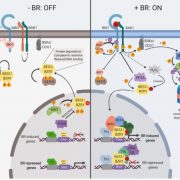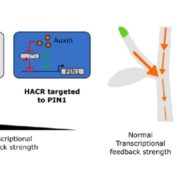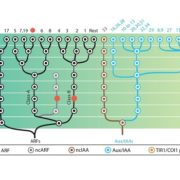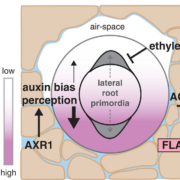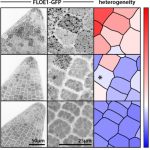Going my own way: Ethylene-independent ACC signaling in pollen tube attraction (Nature Comms.)
 1-Aminocyclopropane-1-carboxylic acid (ACC) is the precursor of the phytohormone ethylene. Here, Mou and co-workers show ACC to act independent of ethylene in the ovule to attract growing pollen tubes. Mutants impaired in ACC biosynthesis had less fertilization and seed setting events. Fertilization and seed set were both rescued by external application of ACC but not ethylene. Visualization of pollen tube growth showed that very few pollen tubes precisely targeted the ovule of mutant flowers. This indicates that ovules of mutants may be unable to attract pollen tubes, an idea that is supported by the finding that LURE1, a peptide that acts as pollen tube attractant, is not properly secreted in the mutants. In neurons, ACC has been shown to act as an agonist for glutamate receptor-like (GLR) calcium channels. Here, the authors found that ACC could also induce Ca2+ transport in ovules. This work underlines the limitations of using ACC as an ethylene supplement and proposes a novel role for ACC in plant Ca2+ signaling. (Summary by Pavithran Narayanan @pavi_narayanan) Nature Comms. 10.1038/s41467-020-17819-9
1-Aminocyclopropane-1-carboxylic acid (ACC) is the precursor of the phytohormone ethylene. Here, Mou and co-workers show ACC to act independent of ethylene in the ovule to attract growing pollen tubes. Mutants impaired in ACC biosynthesis had less fertilization and seed setting events. Fertilization and seed set were both rescued by external application of ACC but not ethylene. Visualization of pollen tube growth showed that very few pollen tubes precisely targeted the ovule of mutant flowers. This indicates that ovules of mutants may be unable to attract pollen tubes, an idea that is supported by the finding that LURE1, a peptide that acts as pollen tube attractant, is not properly secreted in the mutants. In neurons, ACC has been shown to act as an agonist for glutamate receptor-like (GLR) calcium channels. Here, the authors found that ACC could also induce Ca2+ transport in ovules. This work underlines the limitations of using ACC as an ethylene supplement and proposes a novel role for ACC in plant Ca2+ signaling. (Summary by Pavithran Narayanan @pavi_narayanan) Nature Comms. 10.1038/s41467-020-17819-9


